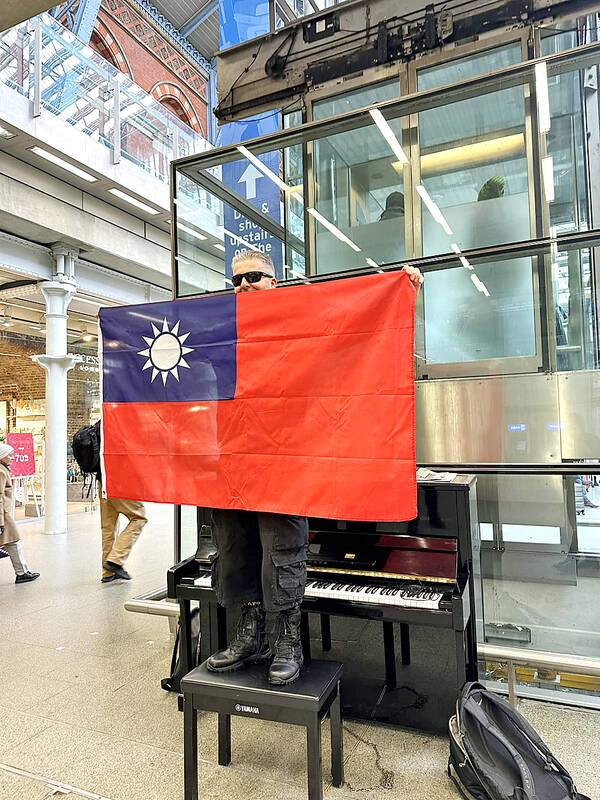British pianist Brendan Kavanagh on Monday held up Taiwan’s national flag during a livestream after having an altercation with a group of Chinese last month.
When Kavanagh, who goes by the name Dr K Boogie Woogie on social media, was recording a livestream from St Pancras International station in London on Jan. 19, a group of Chinese standing in the background loudly insisted that they not be filmed, saying their portrait rights should be protected.
The Chinese, who were holding Chinese flags when the incident occured, said that they would take legal action if their faces and voices were shown online.

Photo: Screen grab from Brendan Kavanagh’s Facebook page
Kavanagh refused to listen, saying the station is a public place.
“We are in a free country, we can film where we want,” he said.
The public piano Kavanagh played, donated by Elton John, was later cordoned off by British authorities due to the incident, he wrote on Facebook on Jan. 25.
After the piano was reopened to the public, Kavanagh held up Taiwan’s flag during a livestream at the station on Monday, saying: “I’m supporting Taiwan.”
Kavanagh then posted a photograph on Facebook of him standing on the piano stool holding up the flag.
It received supportive messages from Taiwanese and others, including Democratic Progressive Party Taipei City Councilor Vincent Chao (趙怡翔), who wrote: “Keep fighting the good fight!”
Chinese Nationalist Party (KMT) Legislator Hung Mong-kai (洪孟楷) wrote that “The ROC [republic of China] flag symbolizes liberty, equality and philanthropy,” and Kaohsiung Department of Tourism director-general Kao Min-lin (高閔琳) thanked Kavanagh for his support.
“Awesome to see friends demonstrating support for #Taiwan in the #UK & giving a shout-out to our peace-loving people,” Minister of Foreign Affairs Joseph Wu (吳釗燮) wrote on X yesterday.
Wu invited Kavanagh to visit Taiwan “to celebrate love for music & freedom of expression in a place where #China ALSO holds zero jurisdiction!”
Hsiao said that the ministry welcomes people from all over the world who support democracy and freedom to support Taiwan.

POSITIVE DEVELOPMENT: Japan and the US are expected to hold in-depth discussions on Taiwan-related issues during the meeting next month, Japanese sources said The holding of a Japan-US leaders’ meeting ahead of US President Donald Trump’s visit to China is positive news for Taiwan, former Japan-Taiwan Exchange Association representative Hiroyasu Izumi said yesterday. After the Liberal Democratic Party’s landslide victory in Japan’s House of Representatives election, Japanese Prime Minister Sanae Takaichi is scheduled to visit the US next month, where she is to meet with Trump ahead of the US president’s planned visit to China from March 31 to April 2 for a meeting with Chinese President Xi Jinping (習近平). Japan and the US are expected to hold in-depth discussions on Taiwan-related issues during the

‘LIKE-MINDED PARTNER’: Tako van Popta said it would be inappropriate to delay signing the deal with Taiwan because of China, adding he would promote the issue Canadian senators have stressed Taiwan’s importance for international trade and expressed enthusiasm for ensuring the Taiwan-Canada trade cooperation framework agreement is implemented this year. Representative to Canada Harry Tseng (曾厚仁) in an interview with the Central News Agency (CNA) said he was increasingly uneasy about Ottawa’s delays in signing the agreement, especially as Ottawa has warmed toward Beijing. There are “no negotiations left. Not only [is it] initialed, we have three versions of the text ready: English, French and Mandarin,” Tseng said. “That tells you how close we are to the final signature.” Tseng said that he hoped Canadian Prime Minister Mark Carney

President William Lai (賴清德) yesterday bestowed one of Taiwan’s highest honors on Saint Vincent and the Grenadines (SVG) Ambassador Andrea Clare Bowman in recognition of her contributions to bilateral ties. “By conferring the Order of Brilliant Star with Grand Cordon on Ambassador Bowman today, I want to sincerely thank her, on behalf of the Taiwanese people, for her outstanding contribution to deepening diplomatic ties between Taiwan and SVG,” Lai said at a ceremony held at the Presidential Office in Taipei. He noted that Bowman became SVG’s first ambassador to Taiwan in 2019 and

A man walks past elementary school artworks at the Taipei Lantern Festival in Ximen District yesterday, the first day of the event. The festival is to run from 5pm to 10pm through March 15.